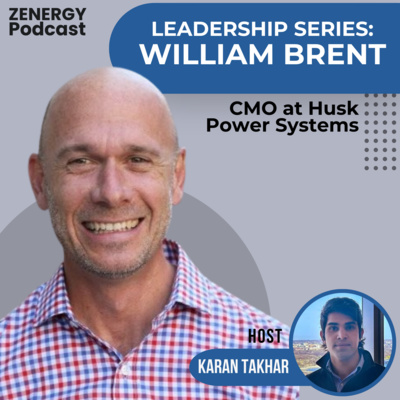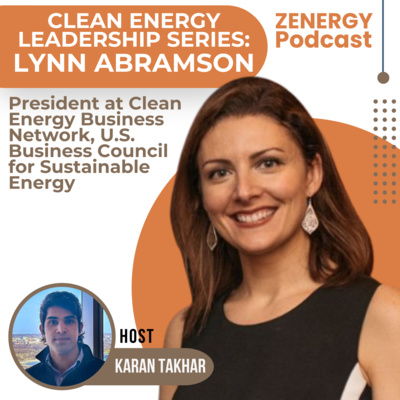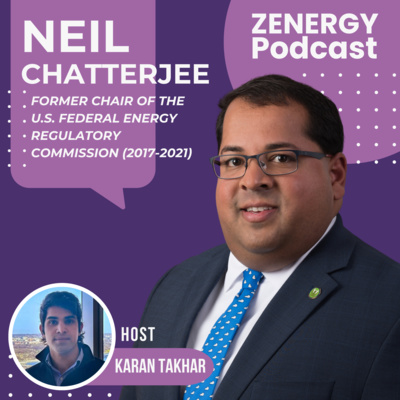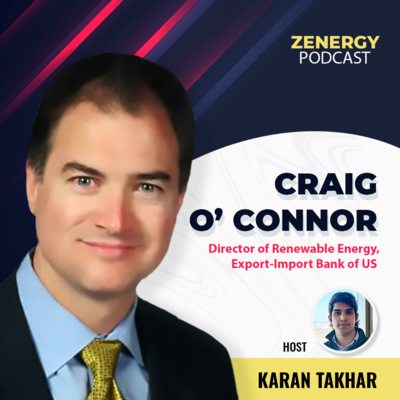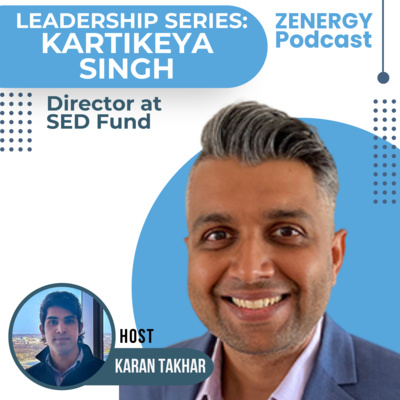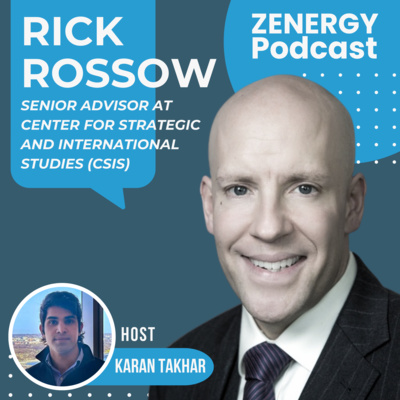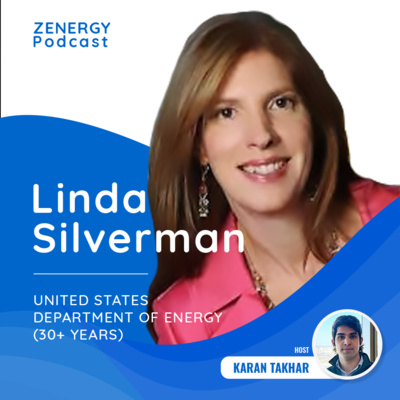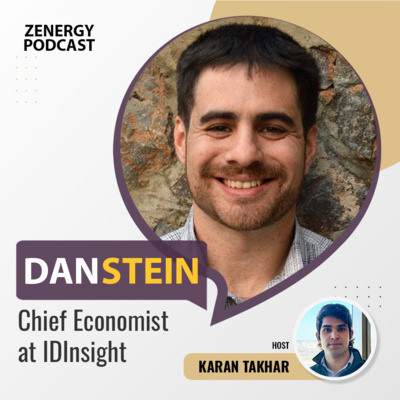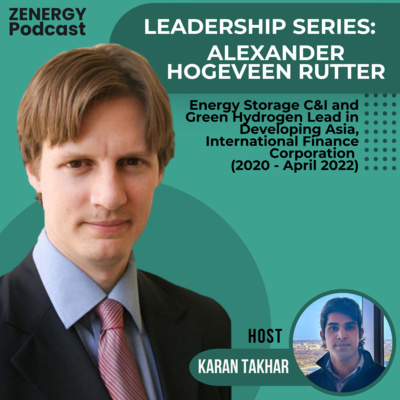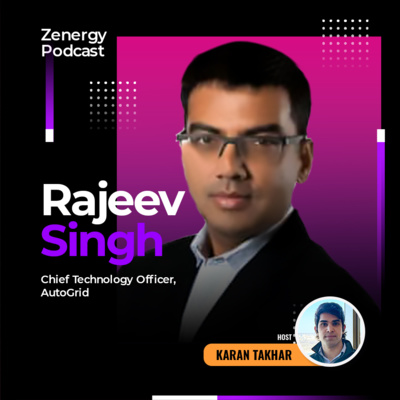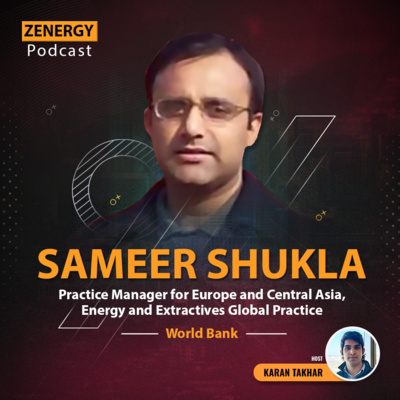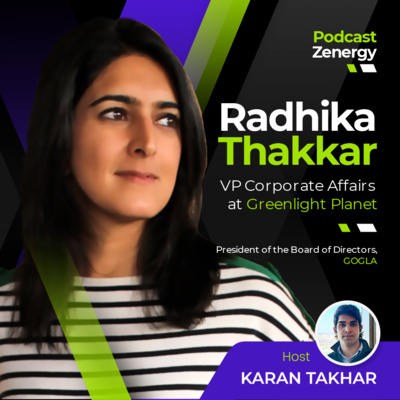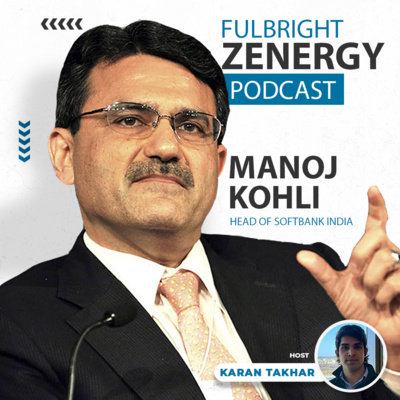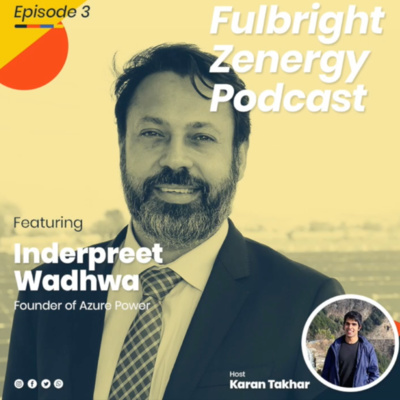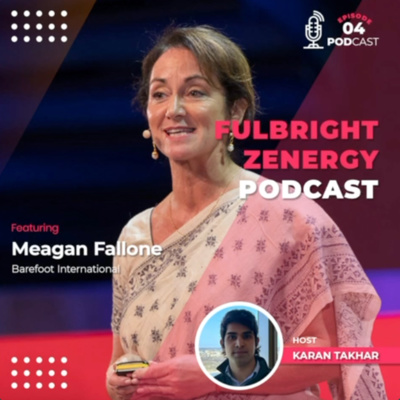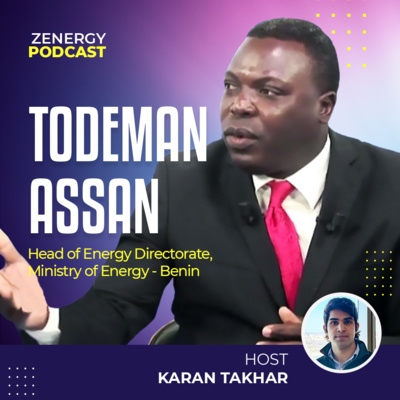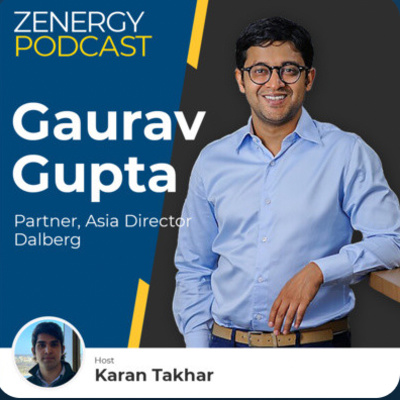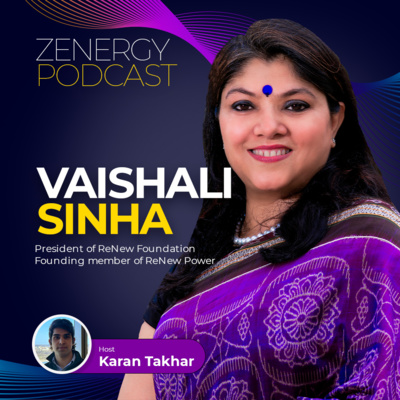Discover The ZENERGY Podcast: Energy Leadership, Finance, and Technology
The ZENERGY Podcast: Energy Leadership, Finance, and Technology

The ZENERGY Podcast: Energy Leadership, Finance, and Technology
Author: Karan Takhar
Subscribed: 5Played: 95Subscribe
Share
© Karan Takhar
Description
The Zenergy Podcast interviews global energy leaders, featuring guests such as U.S. Deputy Secretary of Energy David Turk, former National Climate Advisor Gina McCarthy, former EPA Administrator Andrew Wheeler, and founders of leading financial firms like DBL Partners and Spring Lane Capital. Past guests also include founders of major energy and automotive companies. These conversations share industry developments, highlight clean tech investment opportunities, and provide guidance for young professionals seeking to enter this rapidly growing sector.
166 Episodes
Reverse
In this episode, we will be talking to John Belizaire, who is the CEO of Soluna Holdings, a company helping to shape the future of renewable energy development. Soluna Holdings, Inc. (Nasdaq: SLNH) is currently the leading developer of green data centers that convert excess renewable energy into global computing resources. Prior to starting Soluna and early in his career, Mr. Belizaire was the recipient of the Intel Scholarship Program and after receiving his computer science and engineering degree from Cornell University, went on become the lead architect for Intel’s Digital Enterprise Group. He then subsequently founded a software start-up company, which he later sold for $150 million.
Topics discussed in this this interview:
Renewable Energy Transition & Its Biggest Challenge: Wasted Energy
Computing Is A Better Battery: Why Sustainable Computing Is Ready For Scale Now & Can Be The Best Catalyst For Making Renewable Energy A Superpower
Cryptocurrency Mining, Blockchain & Why They Are Important Technologies That Can Fuel Future Energy
The Future Of The Grid: How It Can Provide Efficient Energy That Reduces Energy Poverty & Enhance Economic Equality Globally
The Evolving Role Of The CEO And Entrepreneur
In this episode, we will be speaking with William Brent, who is the Chief Marketing Officer at Husk Power Systems, which is one of the world’s leading distributed utilities. In this conversation we discuss everything micro grids, including the opportunities and challenges to scale this innovative emerging technology.
Topics discussed in this episode:
1. Background on Microgrid Technology and Development Goals
2. Economics and Business Models of Microgrid Systems
3. Risk Appetite of Development Finance Community
4. Geopolitics of Energy and the Important Role of Microgrids in the Developing World
In this episode, I will be speaking with Ms. Lynn Abramson, who leads the Clean Energy Business Network, which is the small business voice for the clean energy economy. CEBN elevates opportunities for small- and midsize clean energy providers through policy support, market and technology education, and business development assistance and its network spans over 6000. I hope you enjoy this wide-ranging conversation with Ms. Lynn Abramson!
Topics discussed:
1. The evolution of the Clean Energy Business Network
2. Near term obstacles for the growth of the U.S. clean energy economy
3. A deep dive into several promising clean energy technologies
4. Clean Energy Investment inflows for 2021, and investment / financing trends
Brief Description: In this episode, we will be speaking with Neil Chatterjee, a former Commissioner and Chairman of the Federal Energy Regulatory Commission (FERC). Mr. Chatterjee is a policy reformer who broke down market barriers for the entrance of new technologies, particularly for low-carbon technologies. He has been an advocate for harnessing technology to mitigate physical and cyber threats to critical energy infrastructure. Mr. Chatterjee also has experience working as a principal in government relations for the National Rural Electric Cooperative Association. He began his career as a staff member on the House Committee on Ways and Means. Hope you enjoy our conversation!
In this episode, I will be speaking with Craig O’ Connor, the founder of the Renewable Energy Business Development Program at the U.S. Export-Import Bank that, since 2008, has generated over $2 billion in financing for renewable energy projects. We dive into the stories behind Exim’s involvement in financing some of India’s earliest solar projects and also discuss key financing terms that Exim Bank looks for when financing these projects. Hope you enjoy!
In this episode we will be talking to Kartikeya Singh, a director of programs at the SED Fund, where he manages the portfolio to support energy transition efforts around the world. Mr. Singh is also a non-resident fellow at the Center for Strategic and International Studies, in the Energy Security and Climate Change Program. In this conversation, we explore different clean energy technologies and how the US and India can collaborate to help both in their pursuit of a cleaner energy future. Hope you enjoy!
Topics covered in this episode:
1. What spurred Mr. Singh's interest in the energy space
2. Mr. Singh's journey launching a climate youth action organization
3. Insight into what were the key focus areas between US and India is 2016—and how the energy relationship has evolved since then?
4. Near term action steps that you believe the US can take to help facilitate India’s energy transition
5. Electric Vehicle technology collaboration opportunities between the US and India
6. State to state dialogues between the US and India, as well as business transition plans for the large legacy institutions
In this conversation, we speak to Mr. Richard Rossow, a Senior Advisor at the Center for Strategic and International Studies (CSIS), which is a leading think-tank based in Washington, D.C. Richard Rossow holds the Wadhwani Chair in U.S.-India Policy Studies at CSIS. In this role he helps frame and shape policies to promote greater business and economic engagement between the two countries.
Topics covered:
Mr. Rossow's background and what sparked his interest in international affairs
Insight into what role think-tanks such as CSIS have on policy and how they exert influence on international issues
Advice Mr. Rossow would give young people interested in entering international affairs - and what he looks for in candidates applying for entry level positions at CSIS
How the US-India relationship has evolved over the past two decades
Key opportunities and challenges for US-India moving forward
In this episode we will be speaking with Claire Johnson, a co-founder of SunEdison, which at its peak had a market capitalization of $10 Billion and more than 7,000 employees. Sun-Edison is largely attributed as the pioneer of the US solar industry. In this conversation we discuss the origin story of SunEdison, the ‘solar as a service’ and ‘pay as you use model’ which it pioneered, and some of Ms. Johnson’s key learnings during it all. Hope you enjoy our conversation!
Topics covered:
1. What led Ms. Johnson to work in solar and get involved in co-founding Sun Edison
2. The process for convincing the first adopters of SunEdison solar systems (aka Whole Foods)
3. SunEdison had 50% of the whole country's regulatory affairs staff
4. Is now the time to start a solar company?
5. Professional piece of advice to give to younger self
In this conversation we will be speaking with Linda Silverman, who recently retired from the US Department of Energy after spending over 30 years with this government organization. Ms. Silverman and I discuss how the USG energy focus has evolved over time, what the process for multilateral energy events looks like, and also her experience running the world renowned solar decathlon competition. Hope you enjoy this wide-ranging conversation!
DOE Profile: https://www.energy.gov/eere/contributors/linda-silverman
Linkedin: https://www.linkedin.com/in/lssilverman/
Blog: https://lsinsights.com/blog/
In this conversation we will be speaking with Dan Stein, the Chief Economist of IDinsight and the founder of IDinsight’s Giving Green initiative. IDinsight is a mission-driven global advisory, data analytics and research organization that helps global development leaders maximize their social impact. In our conversation we discuss what types of data help maximize climate investments and the work Mr. Stein is engaged in with regards to improving climate outcomes across several emerging markets. Hope you enjoy!
In this conversation we will be speaking with Alexander Hogeveen Rutter who was recently leading the IFC’s market creation efforts for energy storage and green hydrogen in developing Asia, and is now spearheading private sector development initiatives for the International Solar Alliance. In this conversation we dive into the economics of energy storage technology and whether renewable energy systems paired with storage can currently outcompete coal generation plants.
Links to referenced articles:
There is no economic case for new coal plants in India: https://econpapers.repec.org/paper/aloisipdp/21-04.htm
Coal Plant Repurposing for Ageing coal fleets in developing countries: https://esmap.org/esmap_coal_plant_repurposing_ageing_coal_fleets_in_developi
Topics covered in this episode:
1. Insight into what sparked Alexander's interest in the energy space
2. Main costs of energy storage technologies and how these costs have evolved over time
3. Breakdown analysis of "Where is RE + Storage cheaper than coal?"
4. Variable cost of coal vs. RE + storage
5. Key hurdles that must be overcome for storage technologies to ramp up
Rajeev Singh is the chief technology officer of AutoGrid, a company which is known as a pioneer in the energy management space—and the first company that was backed by Arpa-E to pursue research in smart grid applications. Mr. Singh was AutoGrid’s first engineer, and in this conversation, we discuss AutoGrid’s work with helping grid operators integrate renewable energy. Hope you enjoy my conversation with Mr. Singh!
Topics covered in this podcast:
The story behind AutoGrid and Mr. Singh's initial attraction to the company
How AutoGrid leverages Cloud servers to help manage supply and demand flows
Why is elasticity important for AutoGrid's functionality?
What is AutoGrid Flex and how do utilities benefit from this service?
How is AutoGrid able to manage renewable energy generation at such a wide scale?
The variables AutoGrid takes into account when forecasting generation and consumption
What is the energy storage management system that AutoGrid has developed?
Sameer Shukla is the Head of Global Energy Practice World Bank for the European and Central Asian regions. Mr. Shukla's background is in finance and energy and he has been working for the World Bank for 24 years. Throughout his career, Mr. Shukla has been working to support countries in energy security and reforms and also to help them successfully manage the energy transition. In this interview, Mr. Shukla discusses the global shift towards sustainable forms of energy, and the important factors which a government must consider as it seeks to create an enabling environment. Mr. Shukla also talks about the importance of private investment, and the key obstacles that emerging countries must overcome to successfully integrate renewable energy sources.
Topics to be discussed:
A brief introduction to Mr. Shukla and his involvement the global renewable energy space
Is there a clear global transition towards cleaner forms of energy and where in this process do various countries stand?
What are the most important factors for the integration of renewable energy adoption in emerging markets?
Are investors becoming more willing to invest in these long-term time horizons in developing countries?
What are the challenges which need to be addressed in order for renewable energy to reach greater penetration levels?
How does the World Bank uses its capital provision commitment to facilitate more capital investments
In this episode we will be speaking with Radhika Thakkar, one of the earliest employees of green light planet, a leading global provider of solar home energy products to over 45 million rural consumers that employs over 1000 dedicated individuals. Ms. Thakkar helped expand the company’s presence from India to Africa, Southeast Asia, and Latin American within one year of operations, to include hundreds of channel parters in more than 50 countries around the world today. Ms. Thakkar is also the president of the board of directors of Gogla, which is the global association for the off-grid solar energy industry and represents over 200 organizations. Hope you enjoy our wide-ranging conversation!
Topics covered under this podcast:
1. What was the origin story of Greenlight Planet?
2. Key early moments in the Greenlight Planet trajectory
3. Evolution of Greenlight Planet products
4. Evolution of the solar off-grid market
Manoj Kohli is the current head of SoftBank India and the former CEO of Airtel. Mr. Kohli also was the founding CEO of SoftBank Energy (SBE), and was instrumental in enabling SBE to develop 5.5 GW of solar capacity in the Indian market. In this conversation Mr. Kohli shares the story behind what propelled SoftBank to invest in this market in 2015, and how the risks have evolved over the years. This conversation concludes with great guidance to the younger generation — developed from years of experience as a business leader and mentor for countless entrepreneurs.
Topics covered in this podcast:
1. How will renewable energy shape India’s global leadership position in the next decade?
2. When will energy storage become an affordable possible solution?
3. How did the risks in the Indian renewable energy sector evolve from 2015 onwards?
4. What role have foreign direct investments played in the development of RE industry in India?
5. Which will be more difficult to attract, long-term debt, equity or short-term debt?
6. What ultimately led SoftBank to invest in the solar sector in India in 2015?
7. What are the focus areas of possible collaboration between India and the US?
8. Guidance from Mr. Kohli to the younger generation
Inderpreet Wadhwa is the founder of Azure Power, which is one of India’s leading renewable energy development companies that has a total installed capacity of 7 GWs.
Azure power was the first renewable energy company to have an IPO and the first of any Indian energy company to list an issuance of solar green bonds in the international market.
In this conversation Mr. Wadhwa explains how he developed Azure Power into one of the most successful energy companies in India and reflects on the challenges the company was able to overcome along the way. Topics covered in this podcast: Mr. Wadhwa briefly introduces himself and his involvement into the solar sector [6:41] The story behind one of the earliest Indian solar opportunities How did solar energy in India take off in the early days? [11:22] What were the challenges in the early days of the solar sector and how have these evolved over time? Will tariffs continue to be commercially viable even at these extremely low prices? [35:03] An incredible piece of advice for the young professionals from Mr. Wadhwa
Meagan Fallone is the recent CEO and current board member of Barefoot College International, which received a Skoll foundation award for its pivotal work in helping to improve the livelihoods of rural communities across the globe. Barefoot College was founded in 1972 and now has an established presence in 93 countries across the world, with its decentralized energy applications producing 1.6 GW of renewable energy annually. In this conversation we explore Barefoot’s model and how it is able to scale to the world’s most diverse and impoverished regions. Hope you enjoy my conversation with Ms. Meagan Fallone!
Topics covered in this podcast:
1. How has mountain climbing impacted Ms. Fallone's ability to navigate fear?
2. Ms. Fallone walks us through a typical day while travelling in a new international village
3. Barefoot contributes 1.6 gigawatts of sustainable energy annually via decentralized systems
4. How is the Solar Mama model targeted towards the lower level of the pyramid?
5. How is technology incorporated in the solar mama training program?
6. Women at the center of impact in developing communities
7. How is the training system communicated to such diverse groups of people?
8. Ms. Fallone gives insight into Barefoot College's end to end technology system
9. Ms. Fallone offers her guidance to the younger generation
Todéman F. Assan is the Head of the Ministry of Energy, Water and Mines in Benin. Benin is importantly situated in West Africa and is where the HQ for the West African Power Pool is based. In this interview, Mr. Assan discusses the West African renewable energy landscape, the challenges that have to be overcome for its development and the process of formulating solar projects across this region. I hope you enjoy this conversation with Mr. Assan!
Topics to be discussed:
[1:40] A Brief introduction to Mr. Assan
[2:40] What is the current energy mix of exports versus imports in Benin
[7:20] What are the challenges of building out the transmission and distribution lines in urban areas?
[8:30] Are there any government plans to increase Benin's solar generation capacity?
[13:20] What are the tariff rates for Benin's existing solar projects?
[15:05] Is the financing for long-term renewable energy projects guaranteed by the Benin government?
[21:13] What is Benin's role in the West African Power Pool
[25:46] What does the future of solar energy look West Africa, given the mission of the WAPP
Gaurav Gupta is the Global Head of Dalberg’s Energy practice, which is one of the world's top impact consulting firms. As the founder of Dalberg's Asia practice, Mr. Gupta has been a key contributor for Dalberg's growth and primarily focuses his efforts in the areas of energy access, sustainability, access to education, and poverty alleviation. In this conversations, Mr. Gupta breakdowns decentralized energy applications and provides his perspective on what he believes the future of energy to look like.
Topics covered in this podcast
1. A brief introduction of the speaker and their involvement in the energy sector
2. What are the categories of energy Dalberg works on?
3. Is Dalberg's focus on centralized or off-grid?
4. Will there be large scale development in decentralized energy distribution across India?
5. Will India be an established global leader in the renewable sector moving forward?
Vaishali Sinha is a founding member of ReNew Power and president of the ReNew Foundation, which is the largest renewable energy development company in India, with more than 10 GW’s of operational capacity. In our conversation, Ms. Sinha shares what the early days of ReNew looked like, how the idea came about, and what were the key inflection points in the company's journey. Additionally, this podcast episode includes a clip of our conversation with Anand Gupta, who led ReNew’s recent acquisition efforts for Climate Connect.
Topics covered in this podcast:
[2:00] What differentiates ReNew and separates it from the competition?
[6:56] What does the digital initiative entail?
[9:47] Mr. Anand Gupta explains the culture around ReNew's innovation
[12:21] What process did the acquisition process of Climate Connect look like and how does it fit ReNew’s strategy?
[16:06] Ms. Sinha talks about the story behind Goldman Sachs' investment, an early inflection point
[22:51] What are the foundation plans for the Lighting Lives Program?
[26:53] What are the foundation plans for the ReWind Program?
[32:09] What advice would Ms. Sinha give to the younger generation?



